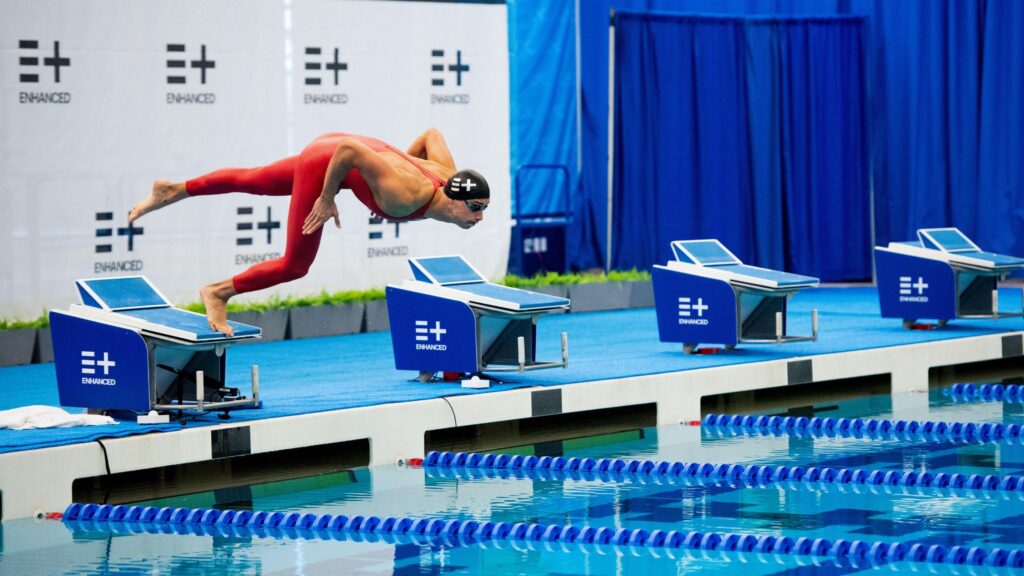The recent announcement regarding the Enhanced Games has stirred significant debate in the world of sports. This newly conceived event promotes the use of performance-enhancing drugs, contradicting traditional sports integrity. Central to this controversy is swimmer Kristian Gkolomeev, who claims to have broken a long-standing world record in a behind-closed-doors time trial. The 31-year-old Greek swimmer swam a 50-meter freestyle in an astonishing 20.89 seconds, surpassing the previous record of 20.91 seconds held by Brazilian swimmer César Cielo since 2009.
Interestingly, Gkolomeev’s world record was achieved during a trial held in North Carolina in February after he decided to begin taking banned substances when he signed up for the Enhanced Games earlier in the year. Notably, during the 2024 Olympics, where he finished fifth, Gkolomeev clocked 21.59 seconds, which was considerably slower than his recent time. The Enhanced Games are set to promote various sports such as short-distance swimming, sprinting, and weightlifting, where athletes are allowed to use banned substances, raising ethical concerns about athlete health and the integrity of competition.
The event has taken on additional significance with heavyweight backing from influential figures, including Donald Trump Jr. and billionaire investor Peter Thiel. During the event’s glitzy launch in Las Vegas, the host city for their inaugural competition was announced, scheduled from May 21-24, 2026. The sponsorship suggests a blend of entertainment and sport, making the entire atmosphere feel more like a spectacle than traditional competitive athletics.
Gkolomeev himself has expressed enthusiasm, stating, “The Enhanced Games gave me the resources and the team to unlock a new level of performance – and now the whole world can see what’s possible.” His sentiment reflects a growing divide in the perception of sport, where performance is viewed through the lens of permissible enhancement rather than pure athleticism. While he achieved his prestigious time wearing a polyurethane ‘supersuit’—a gear banned in most major swimming competitions since 2009—he also managed a compliant time of 21.03 seconds while wearing allowed textile shorts during a subsequent attempt.
Critics have been vocal about the potential dangers of a sports event that embraces doping as part of its foundational ethos. Renowned anti-doping advocates and organizations like the US Anti-Doping Agency and the World Anti-Doping Agency have expressed grave concerns, labeling the Enhanced Games a “dangerous” and “irresponsible project.” The criticism generally revolves around the health implications for athletes and the undermining of competitive fairness that has underpinned athletic integrity for decades.
The event also claims to prioritize athlete welfare, asserting that participants’ substance use is medically supervised and compliant with US laws, yet experts remain skeptical. Some caution that the lure of high monetary rewards, such as the $1 million prize for breaking records, will potentially pressure athletes into dangerous behaviors without adequate precautions.
The Enhanced Games’ recruiting efforts highlight their aim to attract prominent athletes, with Gkolomeev being joined by other notable figures like Ukraine’s Andrii Govorov and Bulgaria’s Josif Miladinov. Despite the controversy, their participation indicates a significant draw for athletes seeking new opportunities outside traditional structures.
Kristian Gkolomeev, who hails from Bulgaria, carries an athletic legacy, being the son of Olympic athlete Tzvetan Golomeev. After moving to Greece, he developed his swimming career and has won various accolades, including European titles and Olympic appearances. The path from competing under stringent regulations to participating in events promoting drug use marks a drastic shift in the notion of sporting achievement and personal ambition.
In summary, the Enhanced Games represent a paradigm shift in modern sports. By explicitly embracing performance-enhancing substances, the event challenges both the philosophical underpinnings of sport and the practical implications for athlete health and competition ethics. The future of athletics could very well hinge on the outcomes of this extraordinary venture.



